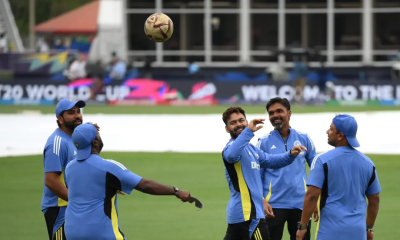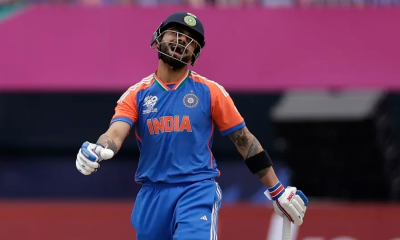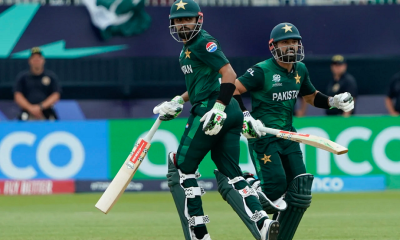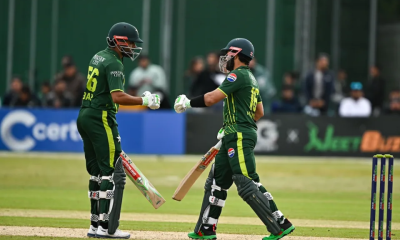Editorial
Guilty until proven innocent?

Monday 2nd October, 2023
There are no signs of an early détente between India and Canada. The two countries continue to trade allegations. Other nations are divided along the lines of strategic alliances rather than anything else. Interestingly, the US government is seen to be tilting towards Canada.
What the ongoing diplomatic row of epic proportions, and Washington’s stance thereon signify is that India has not received full membership of the club of powerful nations. The US firmly stands behind India only when the latter locks horns with China, which the West is all out to keep at bay for economic and security reasons, but when India happens to cross swords with a western nation, it cannot depend on the US to have its six, so to speak. The US has no permanent friends, as has been the experience of Pakistan, which Washington used in the Cold War era and then discarded. Perhaps, the painful diplomatic knock New Delhi has received from Ottawa could not have come without Washington’s knowledge; it could be attributed to strong economic ties India continues to maintain with Russia, refusing to toe the western line over the war in Ukraine. The Indian refineries are reported to have snapped up discounted Russian oil since the West imposed sanctions against Russia.
Canadian Prime Minister Justin Trudeau may not have expected India to strike back with might and main, resorting to tit-for-tat expulsion of diplomats when he went public with his ‘credible allegation’ of India’s involvement in the killing of a Khalistan activist on Canadian soil and ordered an Indian diplomat out of the country. Indian commentators have asked how an allegation could ever be considered credible. Whether the term ‘credible allegation’ is a contradiction in terms, as India has claimed in a bid to deride PM Trudeau, may be a moot point, but it can be used against Canada as well. One can argue that India’s allegation that Canada has become a haven for terrorists is credible, and therefore Canada should be dealt with in the same manner as the other countries that harbour terrorists and face hostile action at the hands of the West.
The Trudeau government’s judgement and its ability to engage in critical inquiry, which involves gathering facts, questioning assumptions, evaluating evidence, considering multiple perspectives and arriving at well-reasoned conclusions, are in serious doubt. It was only the other day that a nonagenarian Nazi veteran was mistaken for a Ukrainian freedom fighter, brought to the Canadian parliament and honoured during Ukrainian President Volodymyr Zelensky’s visit. (The Fuhrer would backflip in his grave in glee if he knew the Canadian government’s faux pas!)
An extreme course of action such as expelling diplomats is something that a country should resort to as pis aller, if at all, only after ascertaining irrefutable evidence to substantiate an allegation against another nation.
Whether India actually did what it is accused of having done in Canada, one may not know, but it behoves Canada, which PM Trudeau proudly calls a country that upholds the rule of law, and other nations which have taken upon themselves the task of protecting global democracy, to respect the cardinal principle of justice that every person accused of a crime is presumed to be innocent unless and until his or her guilt is established beyond a reasonable doubt. Before crossing the Rubicon, Trudeau should have ascertained irrefutable evidence to support his claim that India had a hand in the killing of the Sikh activist.
Credibility is something subjective influenced by various factors including an individual’s beliefs, experiences, knowledge and biases. If ‘credible allegations’ are to be accepted as the basis of offensive action or casus belli, PM Trudeau would find himself on a sticky wicket; a former Indian diplomat named Deepak Vohra has accused Trudeau of having been high on drugs during his recent visit to India to attend the G20 summit, and claimed Trudeau’s plane was found to be full of cocaine. Trudeau’s office has denied this allegation vehemently. What if the Canadian public were to go by the inversion of the principle of presumption of innocence, buy into the former Indian diplomat’s claim and consider Trudeau guilty of drug abuse until he is proven innocent?
Trudeau may have thought India would take his ‘credible allegation’, and the diplomatic offensive based thereon, meekly, the way Sri Lanka did anent his genocide allegation. It is popularly said in this country that the woodpecker, which damages trees by drilling holes in them, finds itself in a bind when it sinks its restless beak into a fibrous banana trunk.
Editorial
Trace all missing firearms

Thursday 1st Junuary, 2026
The CID arrested EPDP leader and former minister Douglas Devananda last Thursday in connection with an ongoing investigation into a pistol issued to him by the Army way back in 2001 allegedly ending up in the underworld. It has claimed that information elicited from Makandure Madush, a notorious criminal, led the police to the weapon hidden in a shrub in Weliweriya.
Devananda is one of the battle-scarred ex-Tiger combatants who courageously stood up to the LTTE and helped defeat it. He survived several assassination attempts, including one inside the Kalutara Prison. Devananda’s predicament has gladdened the hearts of pro-LTTE groups beyond measure, as evident from their social media posts.
The pistol in question was reportedly issued to Devananda at the height of LTTE terror; Madush was arrested in 2019 and killed in October 2020, while in police custody. Curiously, the serial number of the weapon remained intact while it was in the underworld.
Madush is long dead, and there is no way the CID’s claims about the firearm at issue can be checked. The CID, which is under two members of the Retired Police Collective of the JVP/NPP, has become the JVP’s rottweiler. The police are all out to protect the interests of the JVP/NPP government; they suddenly ran out of breathalysers when a government MP caused a road accident the other day. A policeman, assaulted by a government MP and his backers recently for conducting a raid on a cannabis plantation, was arrested and interdicted! The police have not arrested a deputy minister and an NPP mayor, charged with fraud.
Now that the CID is busy probing Devananda’s pistol, let it be urged to launch an investigation into thousands of weapons issued by the Defence Ministry to politicians in the second JPV uprising in the late 1980s, and the arms seized by the JVP during that period.
In January 2019, the then Defence Secretary Hemasiri Fernando disclosed that about 4,700 9mm pistols and revolvers had been licensed, but there was no information about those who had obtained them and, worse, some individuals possessed as many as 15 small firearms each! In 2023, the then State Minister of Defence Premitha Bandara Tennakoon revealed in Parliament that the defence authorities had issued about 700 firearms to 154 politicians in the late 1980s, when the JVP went on a killing spree, but none of them had been returned. This figure, we believe, is a gross underestimate.
The National Commission against the Proliferation of Illicit Small Arms, appointed by President Chandrika Bandaranaike Kumaratunga in 2004, dealt extensively with the issue of illegal weapons in circulation in Sri Lanka, as we pointed out in a previous editorial comment. Its survey report contains valuable information, which, however, needs to be updated. Defence authorities should study this document thoroughly and commission a fresh survey on illicit firearms.
The police must go all out to find the illegal firearms used by the JVP during its second uprising. Most of the JVP’s arms caches have not been traced. SJB MP Dayasiri Jayasekara told Parliament on 27 February 2025 that more than 2,000 firearms seized by the JVP between 1987 and 1989 had not been recovered. One may recall that the JVP attacked several police stations and military camps and grabbed many weapons. In April 1987, it seized the arsenal of the Pallekele army camp. Now that the JVP-led NPP has formed a government and launched a campaign to eliminate gun violence, the Defence Ministry and the CID may be able to ascertain information about the firearms used by the JVP in the late 1980s.
Hardly a day passes without incidents of gun violence. Two shooting incidents were reported from the Western Province yesterday. The proliferation of illicit firearms in Sri Lanka can be attributed to several key factors, according to researchers; they include gunrunning, illegal operations carried out by rogue elements in the police and the armed forces, local arms manufacturing, and criminals gaining access to arms caches of the LTTE and the weapons that went missing in the late 1980s.
The police produced 12 suspects before the Colombo Chief Magistrate on March 22, 2019, for having supplied weapons retrieved from some buried LTTE arms caches in Kilinochchi to criminal gangs elsewhere. The LTTE seized firearms from the police, the armed forces and the rival militant groups like the EPDP. It is incumbent upon the police to make a serious effort to trace all illegal firearms. Let that be their New Year resolution.
Editorial
Health ills: The curse of corruption

Wednesday 31st December, 2025
The health sector has long been free from the clutches of the likes of Keheliya Rambukwella and his bureaucratic lackeys, but it continues to be plagued by various rackets and frauds, as evident from the shocking Ondansetron scandal. The corrupt survive regime changes and continue their sordid operations, enabling politicians and officials to enrich themselves at the expense of patients.
The National Medicines Regulatory Authority (NMRA) has become a metaphor for serious lapses and malpractices. No wonder this country is a dumping ground for substandard and falsified medicines. The absence of proper drug testing facilities has benefited corrupt officials and their political masters alike. Hence successive governments have chosen to allow the status quo to remain while bellowing rhetoric and promising to safeguard patients’ rights and eliminate corruption.
The issue of poor-quality and unsafe drugs has become overpoliticised in this country. The Opposition uses it as a bludgeon to beat the government in power and gain some political mileage. During its Opposition days, the JVP/NPP would bash the then rulers for endangering the lives of patients by allowing substandard or fake drugs to be imported. Today, the boot is on the other foot; those who were accused of striking corrupt pharmaceutical deals are taking up the cudgels for the rights of the sick and inveighing against the JVP/NPP politicians and their loyalists. Partisan politics has thus eclipsed the real issues that need to be addressed to eliminate bribery and corruption in the health sector and ensure drug safety.
The need is not for rhetoric and moral grandstanding. A respected medical professional analyses the issue of poor-quality drugs in Sri Lanka, in an article published on the opposite page today. He has pointed out what needs to be done urgently to find a solution. Dr. B. J. C. Perera has stressed the need for a state-of-the-art laboratory to test medicines. He says drugs must be tested properly before they are released for use, besides being subjected to proper random post-marketing surveillance. At present, the health authorities have to go by manufacturers’ own certification in granting approval for imported pharmaceuticals. There are many other medical professionals, academics and other experts who have studied the issue at hand and provided valuable insights. One can only hope that the government will care to ascertain their views and take steps to ensure drug safety.
Meanwhile, another scandal in the health sector has come to light. Dr. Rukshan Bellana has claimed that he was removed as Deputy Director of the National Hospital of Sri Lanka (NHSL), Colombo, recently, because he sought to have a reagent racket probed by the Commission to Investigate Allegations of Bribery or Corruption and the CID. Stocks of substandard or contaminated reagents have been procured at the expense of the state coffers for the NHSL laboratory, Dr. Bellana has alleged. This serious allegation must be probed thoroughly.
There is more to the reagent issue than the fraudulent procurement practices. Calls for a pricing formula for reagents to prevent the suppliers from keeping the prices of those products unconscionably high have been ignored. It must be made mandatory for the import prices of all reagents to be revealed so that massive profit margins cannot be kept at the expense of the public. Successive governments have allowed importers to increase the prices of reagents according to their whims and fancies and drive the cost of testing up. Health sector trade unions have alleged that corrupt practices among politicians and officials who control the procurement process are also responsible for the extremely high prices of reagents.
The health sector is a swamp that must be drained as a national priority without further delay if the interests of patients are to be safeguarded. The JVP/NPP, came to power, claiming that the country had been under a 76-year curse and promising to break it. But going by the sheer number of corrupt deals reported from various public institutions, the politicisation of state institutions, especially the police, and the government’s despicable efforts to appoint one of its cronies as the Auditor General, one wonders whether the ‘curse’ has been extended by one year.
If the government is serious about eliminating corruption in state-run health institutions, first of all, it should develop a proper understanding of the multi-faceted nature of the issue. Only a special probe, presidential or parliamentary, will help grasp its enormity and determine how best to tackle it.
Editorial
The Customs and revenue bubble

Tuesday 30th December, 2025
Sri Lanka Customs is on cloud nine, boasting that it has set a revenue record. It says it has raised more than Rs. 2,497 million, which is in excess of the targets set by the government for the current year. An increase in state revenue is certainly a very positive development, but how that goal has been achieved should be revealed to the public.
There have been exponential tax increases and they have enabled the government to boost its revenue significantly. The Customs Department has been able to meet its revenue targets thanks to the lifting of restrictions on vehicle imports after a lapse of several years and tax hikes. The Customs has admitted that taxes on imported vehicles have amounted to about Rs. 870 billion in 2025. Thus, one can argue that vehicle imports have created a revenue bubble, which may not last long. An increase in the Customs’ revenue has come at the expense of the rupee, which is depreciating. So, there is no cause for celebration, and the government has to tread cautiously.
Spokesman for the Customs Chandana Punchihewa, addressing the media yesterday, blamed cargo clearance delays on a container backlog created by Cyclone Ditwah. Extreme weather events no doubt cause delays in ports, but in this country port delays occur even during long spells of fine weather. Protracted delays in the Colombo Port, in January 2025, led to the release of 323 red-flagged containers without Customs inspection. What they carried is anybody’s guess.
Excuses are of no use where port delays are concerned. Delays ruin ports, for they drive away major shipping lines. It has been reported that several international shipping lines have opted to bypass the Colombo Port, which is facing escalating congestion due to various factors related mainly to capacity and efficiency—not adverse weather as such. The Customs cannot absolve itself of responsibility for this sorry state of affairs in the Colombo Port, which has also been facing strategic neglect.
As we argued in a previous comment on port congestion, the Ports Authority, the government and the Customs must formulate a strategy to eliminate delays. If the Customs cannot cope with the situation, the Coast Guard personnel can be called in to help clear cargo; they are qualified to handle such tasks. The government ought to take cognisance of formidable challenges Sri Lanka faces from the other ports in the region, especially India’s newly built Vizhinjam port, which is becoming a major attraction for international shippers who are averse to delays. In global logistics, shipping lines place very high value on on-time delivery, reliability and efficient operations.
The government must make a serious effort to enhance the efficiency and capacity of the Colombo Port to retain the transshipment traffic historically routed via Colombo. There is a strong possibility of shipping lines rerouting feeder services away from Colombo to Vizhinjam, adversely impacting Colombo’s network role, as we have said previously, quoting shipping experts.
Vizhinjam has several key advantages over Colombo. It advertises itself as a deep-water port with a 24 m natural draft, which enables it to accommodate ultra-large container vessels without dredging; its proximity to the main east–west shipping route helps vessels to call without significant deviation, reducing voyage time and costs. Automation, modern cranes, faster turnaround times, enhanced operational efficiency and attractiveness to shipping lines are other advantages India’s new port has over Colombo.
Sri Lanka Customs may brag about its ‘revenue record’, but it must not lose sight of the need to enhance its productivity in view of challenges from other ports in the region to Colombo. It should reveal how it is going to meet the revenue targets set by the government when vehicle imports decrease, causing the current revenue bubble to burst.
-

 News7 days ago
News7 days agoStreet vendors banned from Kandy City
-

 Sports4 days ago
Sports4 days agoGurusinha’s Boxing Day hundred celebrated in Melbourne
-

 News7 days ago
News7 days agoLankan aircrew fly daring UN Medevac in hostile conditions in Africa
-

 News2 days ago
News2 days agoLeading the Nation’s Connectivity Recovery Amid Unprecedented Challenges
-

 Sports5 days ago
Sports5 days agoTime to close the Dickwella chapter
-

 Features3 days ago
Features3 days agoIt’s all over for Maxi Rozairo
-

 Features7 days ago
Features7 days agoRethinking post-disaster urban planning: Lessons from Peradeniya
-

 Opinion7 days ago
Opinion7 days agoAre we reading the sky wrong?

























